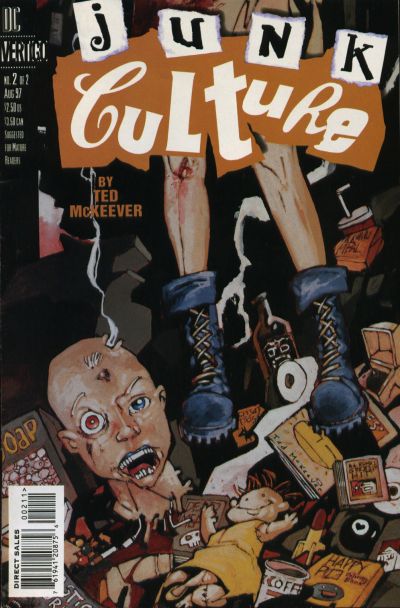Thoughts, reviews, rants, laments, and general chatting about the wonderful world(s) of comic books.
Showing posts with label Ted McKeever. Show all posts
Showing posts with label Ted McKeever. Show all posts
Jul 8, 2018
The 40 Years of Comics Project - Day 1229: Junk Culture #2, August 1997
(There's some Philip K. Dick-level mindfucking going on in today's comic. But I'll talk about it tomorrow. Got an early morning tomorrow!)
There is something interesting that happens at the beginning of a story. We bring to it every experience we've ever had, and from that combination create for ourselves a context through which to understand the narrative we're about to experience. Junk Culture does such a good job at the beginning of taking that combination and playing on its predictability. Issue #2 blows everything up. And that's not least because Eve and Lola blow shit up in this issue. Lots of it.
As I noted up there, there's a bit of a Dickian revelation about half way through the comic, and the uncertainty that I was talking about the other day in describing Mr. McKeever's art is reflected also in the story. Uncertainty replaces the foundation we created with our perspectives and the information given in the first issue. I love when a comic messes with your head a bit like that.
This has also got to rate as one of the bloodier comics I've read, though really nothing's going to come close to Faust. Thank goodness.
More to come...
Jul 6, 2018
The 40 Years of Comics Project - Day 1227: Junk Culture #1, July 1997
I'm fascinated by Ted McKeever's art. There's a relatively short list of artists upon whose name I'll buy a comic, and Mr. McKeever's definitely one of them. The world he envisions seems to have no symmetry, and though quite stylized, in this at least it is realistic. Further, his narrative style skews toward the Lynchian, in that we really don't have a lot of idea what's going on, any more than the characters caught in this strange tale do. And thess, both artistic and narrative bents, seem to be a through line in his work. Which, of course, is what leads to my fascination.
Today's issue is interesting, though the metaphor of the teenager literally programmed by modern society is a bit on the nose. That said, the way that advertising affects young people really is quite profound, as is symbolized in today's comic. What Mr. McKeever's tale is warning us of is what happens when the programming takes, and the programmed realizes that it's moved beyond us.
More to come...
Feb 27, 2016
The 40 Years of Comics Project - Day 368: Marvel Knights Double-Shot #2, July 2002
(Read today. Will blog tomorrow.)
(It's tomorrow now - isn't that an odd statement to make?)
This comic was sort of made for me. Not only does it feature a very typically Morrisonian tale of uncertain identity and twist endings, but the second story is a Man-Thing tale written and illustrated by the amazing Ted McKeever. I don't have a lot of McKeever's work, but, for me, he represents that farthest reach, stylistically, of the aesthetic that crystallized in 90s Vertigo. Though his work with Rachel Pollack on Doom Patrol is not amongst the best-remembered parts of that series, I quite enjoy it. McKeever's messy unreality always jibed well with the tone of the series to me.
The Morrison tale in today's comic is a nice little piece of work, trading rather explicitly on the PKD connection I mentioned the other day. We've got telepathic mutants who aren't actually telepathic mutants, double and triple agents who aren't aware of their own double-ness, a badass super spy whose powers seem to include always ending up with very attractive women. There's a call-back of sorts in the story to Morrison's work on Animal Man, in that the "telepaths" in the story resemble the yellow aliens that originally gave Buddy Baker his powers. For Morrison's run, these aliens were ciphers for the creative force of the universe (i.e., Morrison himself), so what they're doing here, and their true identities, are interesting questions to ponder.
When we discuss short stories in an academic setting, we often make the distinction between time and place. Short stories are not meant to necessarily be about time - that's why they're short. They're a brief glimpse at a discreet slice of time, in which the important elements to note are the place-based elements. The setting, the interactions of the characters. We're not in it for an extended meditation on these things, but to witness, or experience, the action, and to take from that action a small kernel of knowledge. Given the very visual nature of comics, I wonder what differences in the parsing of comics short stories has from that of prose short stories. Fodder for further thought, I think.
Alright. Continuing on our Morrison week, we'll jump back a bit in time tomorrow, back to some 2000 A.D. material. Onward!
Subscribe to:
Posts (Atom)


